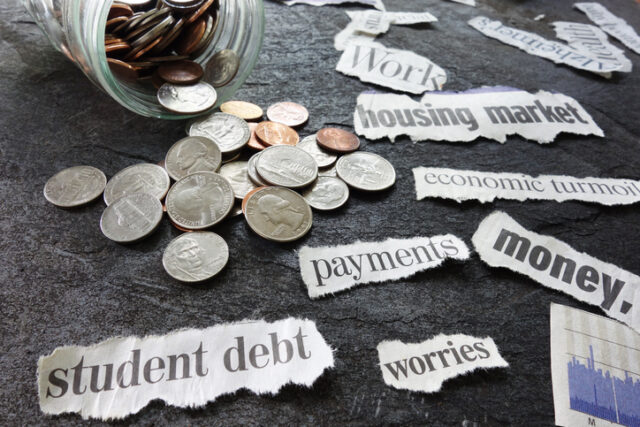It’s not always easy to manage your money, especially when there’s not all that much of it to go around.

Between bills, the general cost of living, and even having a few extra quid to buy yourself something nice or go on holiday so you don’t feel like you’re working for nothing, your bank balance can soon go down to zero pretty quickly — or even land you in your overdraft or credit card debt. However, it’s possible to be a bit smarter with what cash you do have, especially if you manage to avoid falling into these money traps. Your stress levels and your credit score will thank you.
1. Impulse buying when you’re stressed

We’ve all been there—feeling overwhelmed by work, life, or just the demands of the day, and before you know it, you’re on a shopping spree. Whether it’s online or in-store, those impulse buys can seem harmless at first. But then you get home and wonder why you bought yet another pair of shoes or that random gadget. It’s the same old cycle—temporary relief from stress followed by buyer’s remorse. The problem is, over time, these purchases add up, and that’s money that could have gone toward something much more useful. To avoid this, pause before you pull out your credit card and ask yourself: “Do I really need this, or is it just a quick fix for how I’m feeling right now?” Taking a breather can help you refocus. Instead of spending to feel better, find ways to address your stress that don’t come with the guilt of overspending.
2. Using credit cards without paying attention to interest rates

Credit cards can be super handy; they help you build credit, earn rewards, and give you some flexibility when it comes to paying for things. But, if you’re not paying attention to the interest rates, those rewards can easily get wiped out by hefty interest charges. It’s easy to ignore the fine print and swipe away, thinking you’ll pay it off next month, but before you know it, the balance keeps growing and growing, and you’re left with a hefty bill at the end of the month. So you don’t end up getting caught in this trap, make it a habit to check the interest rate on any credit card you’re using. Ideally, pay off your balance in full each month so you don’t accrue interest. If that’s not always possible, consider switching to a card with a lower interest rate, or try to limit the number of purchases you put on your card until you can pay it off. This way, you can use your credit cards to your advantage, without letting interest charges eat into your finances.
3. Spending on things you think will improve your life, but don’t

How many times have you bought something with the best of intentions, thinking it’ll make life so much easier or more enjoyable? Maybe it’s a new kitchen gadget, an expensive subscription service, or a trendy fitness tracker. The truth is, a lot of the time, these things sit unused in the cupboard or on your shelf, taking up space and adding nothing to your life. These buys are often made in the hope of improving something — our productivity, our health, or our enjoyment—but all too often, they just end up being more clutter. Next time you’re thinking of buying something that promises to change your life, ask yourself if it’s really something you need or if it’s just another “shiny object” that’ll end up collecting dust. Sometimes, just taking a beat to reflect on whether it’s a genuine need or an impulse can save you from wasting your money. Remember, true improvement comes from habits, not gadgets.
4. Not bothering to build an emergency fund

It’s easy to convince yourself that emergencies won’t happen to you… until they do. Life has a funny way of throwing curveballs, whether it’s a surprise medical bill, a car repair, or even a job loss. Without an emergency fund, these sudden expenses can throw your entire financial situation into chaos. While it’s not always easy to put money aside when there are so many things to pay for, not having that safety net can make a stressful situation even worse. Start small, even if it’s just putting aside a little each month. Having a cushion to fall back on gives you peace of mind and allows you to handle life’s curveballs without falling into debt. The key is consistency. Even setting aside a small amount regularly adds up over time, and soon enough, you’ll have the security you need to face the unexpected.
5. Not comparing prices before big purchases

We’ve all been caught up in the excitement of buying something we’ve wanted for ages, only to later realise we paid way more than we needed to. Whether it’s a new appliance, a gadget, or even a holiday, not shopping around or comparing prices can easily leave you overpaying. It’s easy to skip over the research, especially when you’re excited about making a purchase, but this is where a little extra time and effort can save you a lot in the long run. Before making any big purchases, take the time to compare prices online, look for coupons or discounts, and even consider waiting for sales. It might not always be fun, but spending a few extra minutes can result in significant savings. And if it’s something you really need, knowing you got the best deal will feel way better than rushing into a decision and regretting it later.
6. Forgetting about small monthly subscriptions

Subscriptions can be sneaky! One minute you’re signing up for a streaming service or a gym membership, and before you know it, you’re paying for 5 different things every month that you hardly even use. Those small monthly payments might seem trivial, but they can add up quickly. It’s easy to forget about that one app you signed up for six months ago, or the magazine subscription that’s collecting dust. It’s best to do a monthly “subscription audit.” Check your bank statements for any recurring charges and decide whether you’re actually using them. If not, cancel them. It’s amazing how much money you can save by trimming these unnecessary costs, and doing this regularly ensures you’re only paying for what you really use.
7. Trying to keep up with other people

Social media has a way of making everyone’s life look perfect, and that can make you feel like you need to keep up with everyone else’s purchases or lifestyle. But buying things just to match what everyone else is doing, whether it’s the latest gadget, the trendiest clothes, or going on a lavish holiday, can create unnecessary financial pressure. It’s easy to fall into the trap of thinking you need to have what they have, but doing so often leaves you feeling financially stressed and behind. The trick is to stop comparing yourself to other people and focus on your own financial goals. Make purchases that are meaningful to you and that align with your own needs, not what you see others doing. It’s your money, and it should be used in a way that brings you value and aligns with your goals, not someone else’s Instagram feed.
8. Falling for “too good to be true” deals

We’ve all been tempted by those “limited-time-only” or “massive discount” deals that pop up online, only to realise later that the savings weren’t as great as they seemed. Some of these deals are designed to make you feel like you’re getting a bargain, but often they come with hidden costs, poor-quality products, or simply aren’t as good a deal as they appear. Getting sucked into these can lead to overspending on things you don’t even really need. Next time you see a deal that sounds too good to be true, take a step back. Check reviews, read the fine print, and see if you can find the same thing at a lower price elsewhere. If it’s truly a good deal, it’ll stand up to a little extra scrutiny. Don’t let the fear of missing out push you into a hasty purchase.
9. Ignoring your long-term financial goals

It’s easy to get caught up in short-term spending. The newest phone, a weekend away, or a spontaneous dinner out—it’s all tempting. But when you ignore your long-term financial goals, like saving for retirement or buying a house, it can come back to bite you later on. Skipping a few months of saving might seem harmless, but over time, it adds up, and suddenly, you’re nowhere near where you want to be financially. It’s all about balance. Sure, treat yourself every once in a while, but make sure you’re consistently putting money aside for your long-term goals. Set up automatic transfers to a savings account or personal pension fund, and make sure to review these goals regularly to stay on track. Even small amounts add up over time, and you’ll be thankful later when you’re prepared for life’s bigger milestones.
10. Not taking advantage of the benefits your job offers

You’d be surprised how many people leave money on the table by not using all the benefits their employer offers. Whether it’s matching contributions to your voluntary pension contributions, discounts on private insurance, or other services, these perks can make a big difference in your overall financial situation. But it’s easy to overlook them when you’re busy with work or just not paying attention. Take the time to find out exactly what benefits your employer offers and make sure you’re using them to their full potential. Contributing to your retirement plan, for example, especially if your employer matches contributions, is like getting free money. These small but impactful perks can have a huge effect on your financial future, so don’t miss out on them.




